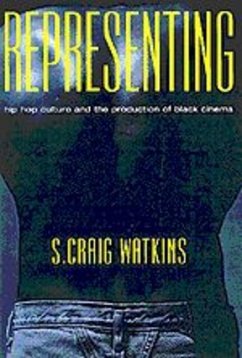In this engaging and provocative book, S. Craig Watkins examines two of the most important developments in the recent history of black cinema -- the ascendancy of Spike Lee and the proliferation of "ghettocentric films" like Boyz N the Hood and Menace II Society. Representing explores a distinct contradiction in American society: at the same time that black youth have become the targets of a fierce racial backlash against crime, drugs, affirmative action, and rap music, their popular expressive cultures have become highly visible and commercially viable. Further, Watkins considers the imprint of black youth on the landscape of black filmmaking. He asks: after decades of neglect, why did the film industry suddenly develop a heightened interest in black cinema? Watkins shows how the black film wave was driven by several factors -- the transformation of the popular film industry; a reinvigorated independent filmmaking niche; the cross-marketing of music, video, and film; a burgeoning hip hop consumer culture; and historically specific struggles over the meanings and representations of "blackness" in American culture. He contends that despite social and economic marginalization, black youth have gained unprecedented access to the popular media and continue to influence not only black popular culture but the broader U.S. popular culture scene as well. Representing offers a fascinating look at commercial culture and shows how and why it has become a crucial site for black American youth as they struggle to make their everyday lives more empowering, rewarding, and pleasurable in the face of formidable disadvantages.








